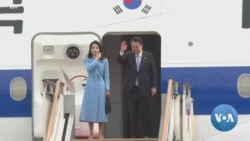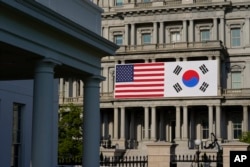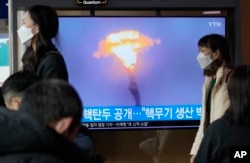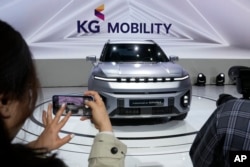When U.S. President Joe Biden hosts South Korean President Yoon Suk Yeol at the White House this week for a state visit, the tone will likely be celebratory, as the two countries mark the 70th anniversary of an alliance that both sides say is stronger than ever.
But beneath the surface, the U.S.-South Korea relationship faces unprecedented challenges — from North Korea's growing nuclear threat, changing U.S. attitudes toward free trade, and questions about how closely South Korea will align itself with the West.
Yoon departed Monday for Washington, the first stop of a six-day visit. On Wednesday, Yoon and Biden will hold a state dinner at the White House — just the second time Biden has granted a foreign leader such an honor. A day later, Yoon will address a joint session of U.S. Congress.
The latter half of Yoon's visit will highlight the ways the U.S.-South Korea relationship has expanded beyond just a security alliance.
Yoon on Thursday will participate in a meeting meant to deepen collaboration between the South Korean and U.S. film industries. Later in the week, he will give a speech at Harvard University and meet biotech and digital scholars at the Massachusetts Institute of Technology.
The conservative Yoon has more explicitly aligned his country with the United States, allowing the alliance in many ways to "probably reach its highest point," according to Scott Snyder, a Korea specialist at the Council of Foreign Relations.
But Snyder, who previewed Yoon's visit in a livestream hosted by the Center for Strategic & International Studies, said the relationship also must deal with several underlying issues that "ultimately revolve around questions of trust."
Nuclear umbrella concerns
Perhaps the biggest question is whether South Koreans trust U.S. promises to defend their country.
The United States has long vowed to use the full range of its firepower, including nuclear weapons, to defeat North Korea. But with the nuclear-armed North now able to threaten the U.S. mainland, some South Koreans question whether Washington would really intervene in a conflict.
According to a poll released Friday by the Seoul-based Asan Institute for Policy Studies, 64% of South Koreans support their country developing its own nuclear weapons to deal with the North. The finding is consistent with numerous polls taken in recent years.
The anxiety is so serious that Yoon himself recently acknowledged South Korea could eventually acquire its own nuclear weapons if its security concerns are not addressed.
To reassure South Koreans, the U.S. military has sent its biggest weapons — including long-range bombers and nuclear-powered aircraft carriers — to participate in highly visible exercises with South Korea.
The two sides have also increased high-level defense coordination, including by holding a discussion-based exercise meant to give South Korean officials a better idea of U.S. thinking on the hypothetical usage of nuclear weapons.
"I think there has been a real recognition in Washington that this isn't business as usual," said Jenny Town, a senior fellow at the Washington-based Stimson Center.
"But is it enough? You know, is it ever really enough? And I'm sure as North Korea continues to focus especially on ICBM development, these demands will continue to grow," Town added.
Ukraine differences
Another source of tension is South Korea's reluctance to arm Ukraine, which is fighting a Russian invasion.
Although South Korea is among the world's largest weapons exporters, it has not approved the sale or donation of weapons to Ukraine, citing domestic laws that regulate sending arms to war zones.
Instead, South Korea has approved the sale of massive quantities of South Korean-made weapons to countries such as Poland and the United States, which are arming Ukraine.
Ahead of his U.S. visit, Yoon appeared to soften his stance on the issue. Yoon told Reuters last week that South Korea could provide more than just humanitarian and economic aid if Ukraine suffered a large-scale civilian attack.
However, in an interview with The Washington Post published Monday, Yoon appeared to walk back that statement, suggesting Seoul must also consider its relationship with Russia.
The issue is controversial at home. According to an opinion poll released Monday, 65% of South Koreans oppose sending military aid to Ukraine.
Spying allegations
U.S.-South Korea tensions over Ukraine were exposed by the recent leak of secret U.S. documents, which appeared to describe private discussions about Ukraine between senior South Korean officials.
Although the leak revealed little if any surprising information about Seoul's position, the documents appeared to indicate Washington was spying on Seoul — one of its closest allies.
Yoon's office has downplayed the spying incident, insisting it will not hurt U.S.-South Korea ties. But many Koreans remain upset.
"Personally, I'm still very surprised and in some sense frustrated," said Park Won-gon, a professor at Seoul's Ewha University. "Because South Korea and the United States — we are allies."
"Everybody knows if the United States is really interested in this issue, just give us a phone call … the South Korean [officials] are happy to answer," he said.
South Korea's left-leaning opposition is especially upset about the issue, accusing Yoon of overseeing lax security policies and demanding an investigation.
Trade tensions
Yoon also faces significant domestic pressure to push back on a new U.S. law that makes South Korean electric vehicles less competitive in the U.S. market.
The rule, passed last year as part of Biden's signature Inflation Reduction Act (IRA), offers tax credits of up to $7,500 to buyers of electric vehicles assembled in North America.
Although the move is meant to exclude China from supply chains and boost U.S. production of electric cars, it also wiped out tax credits for dozens of electric vehicles manufactured overseas, including in South Korea.
Some South Korean officials have also expressed concerns about the U.S. Chips and Science Act, which provides incentives to and sets other requirements on semiconductor makers that set up production facilities in the United States.
The legislation has prompted some Seoul commentators to conclude that the United States no longer espouses its traditional free trade views.
"Many people are surprised and disappointed," said Park, the Seoul professor. "It reminds us of the Trump era, the 'America First' policy."
Yoon's domestic woes
Yoon's position on all these issues is complicated by his low approval rating at home, which is in the low 30% range, according to several recent polls.
Analysts say that may give Yoon limited foreign policy flexibility as he attempts to align his country more closely with the West.
"If he's treading water domestically, it actually inhibits his value as a partner, potentially, if he can't deliver on some of the things he's promising," said Snyder at the CSIS event.
But in Washington, Yoon hopes to encounter a friendlier audience, as he celebrates seven decades of an alliance that is broadly popular in both countries.










